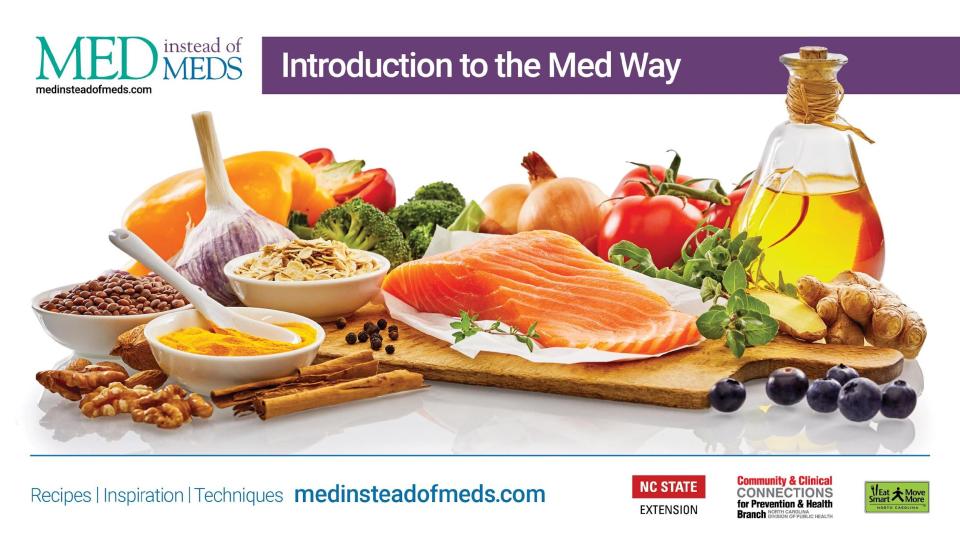Cooking Class Series: Eating the Mediterranean Way
go.ncsu.edu/readext?968904
en Español / em Português
El inglés es el idioma de control de esta página. En la medida en que haya algún conflicto entre la traducción al inglés y la traducción, el inglés prevalece.
Al hacer clic en el enlace de traducción se activa un servicio de traducción gratuito para convertir la página al español. Al igual que con cualquier traducción por Internet, la conversión no es sensible al contexto y puede que no traduzca el texto en su significado original. NC State Extension no garantiza la exactitud del texto traducido. Por favor, tenga en cuenta que algunas aplicaciones y/o servicios pueden no funcionar como se espera cuando se traducen.
Português
Inglês é o idioma de controle desta página. Na medida que haja algum conflito entre o texto original em Inglês e a tradução, o Inglês prevalece.
Ao clicar no link de tradução, um serviço gratuito de tradução será ativado para converter a página para o Português. Como em qualquer tradução pela internet, a conversão não é sensivel ao contexto e pode não ocorrer a tradução para o significado orginal. O serviço de Extensão da Carolina do Norte (NC State Extension) não garante a exatidão do texto traduzido. Por favor, observe que algumas funções ou serviços podem não funcionar como esperado após a tradução.
English
English is the controlling language of this page. To the extent there is any conflict between the English text and the translation, English controls.
Clicking on the translation link activates a free translation service to convert the page to Spanish. As with any Internet translation, the conversion is not context-sensitive and may not translate the text to its original meaning. NC State Extension does not guarantee the accuracy of the translated text. Please note that some applications and/or services may not function as expected when translated.
Collapse ▲Do you have a new year’s resolution to eat more home cooked meals? Or maybe to have a more nutritious diet that supports your health and wellness? Join us in January for a four week cooking series: Eating the Mediterranean Way.
The program will include a presentation, followed by preparing and sharing a meal together, where you’ll receive food preparation tips and tricks along the way. This class is a great way to feel more confident about your skills in the kitchen and get hands-on experience preparing dishes that both taste good and are good for you!
The cost is $20 for the entire series (four sessions). Please plan to attend all four sessions. These classes will be held in our kitchen from 5:30-7:30 p.m. on Wednesdays the following dates in January:
January 10th / January 17 / January 24 / January 31
NOTE: This class is currently full and no longer accepting registrations. If you would like to be contacted if another series starts, please email abigail_pierce@ncsu.edu with your name and class interest.
Registration is required and payment must be made in advance as spots are limited. Register using this Google Form. Payment for this class is due by Wednesday, January 3rd to reserve your spot.
 Eating the Mediterranean Way (also known as Med Instead of Meds) was created by a group of nutrition and health professionals from NC State University and NC Division of Public Health. Eating the Med Way (Mediterranean) has been proven to protect against chronic illness.
Eating the Mediterranean Way (also known as Med Instead of Meds) was created by a group of nutrition and health professionals from NC State University and NC Division of Public Health. Eating the Med Way (Mediterranean) has been proven to protect against chronic illness.
Topics covered include: Change Your Protein, Swap Your Fats, Eat More Fruit and Vegetables, Snack on Nuts & Seeds, Make Your Grains Whole, and Rethink Your Sweets!
Please note: The Med Way is based on how people historically ate in the Mediterranean region and is not necessarily reflective of how people in the Mediterranean currently eat. As such, a modern Mediterranean flavor profile is not necessarily consistent with the Med Way. Med Way dishes can fit into any flavor profile – Italian, Greek, Indian, Mexican, or simply delicious. Med Way dishes are defined by the components that make up what you’re eating (i.e. high-levels of fruits and vegetables, high-levels of mono- and poly-unsaturated fats, lots of fish – not so much red meat), not by a dish’s flavor profile.
For more information, call our office at 828-697-4891, or email Abigail at abigail_pierce@ncsu.edu.




